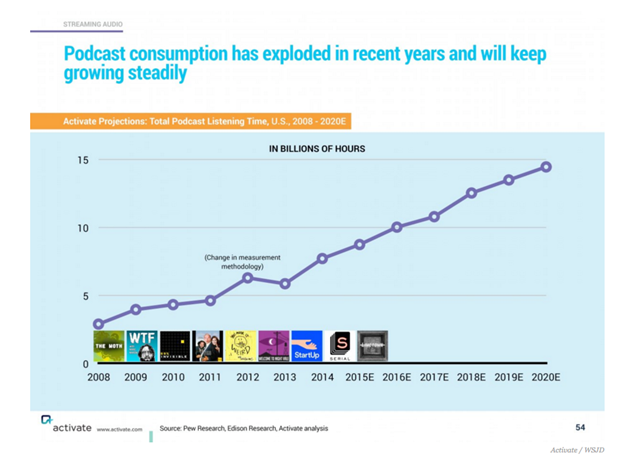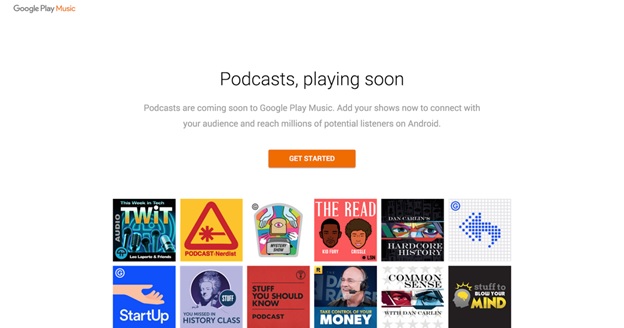 Seth Resler, our Digital Dot Connector, is very involved in the podcasting movement. He’s been personally podcasting for more than five years, and currently hosts All Access’ podcast initiative. At the Nielsen Client Conference next month, Seth will be moderating a great session on the topic. And in today’s guest post, he’s got some big news about podcasting’s short and long-term future. – FJ
Seth Resler, our Digital Dot Connector, is very involved in the podcasting movement. He’s been personally podcasting for more than five years, and currently hosts All Access’ podcast initiative. At the Nielsen Client Conference next month, Seth will be moderating a great session on the topic. And in today’s guest post, he’s got some big news about podcasting’s short and long-term future. – FJ
Over the last year, there has been a popular narrative in the press about the recent “explosion” of podcasting. The success of podcasts like Serial and Invisibilia, along with President Obama’s interview on Marc Maron’s WTF podcast, has led journalists to write story after story about the resurgence of podcasting. Witness, for example, a slide on podcasting from a recent presentation that business strategist Michael Wolf gave at a Wall Street Journal conference on the future of tech and media:
“Podcast consumption has exploded” the title of the slide declares, right above a graph that clearly shows that podcast consumption has not exploded at all. In fact, the data, which comes from Edison Research, shows that podcasts have seen a slow but steady increase in consumption over the last seven years. (We’ve seen the same pattern in the results of our annual Techsurveys.)
At both the New Media Expo and the Podcast Movement Conference earlier this year, Libsyn’s VP of Podcaster Relations, Rob Walch, explained the prevalence of the “podcast resurgence” narrative:
“Serial is a podcast by journalists and journalists like writing about other journalists. So there has been a resurgence in media coverage of podcasting, but not a resurgence in actual podcasting.”
Yet in the radio industry, podcasting seems to be having a watershed moment. This is the year that the New Media Expo, which features a conference track dedicated to podcasting, was absorbed into the NAB in Las Vegas. Public radio had a strong presence at the second Podcast Movement conference, even if commercial radio was largely absent.
High profile behind-the-scenes radio talent, like NPR’s Eric Nuzum and Saga’s Steve Goldstein, left their positions for podcast ventures (even if Eric is reluctant to use the p-word). Scripps acquired the podcasting company Midroll, and Hubbard Radio invested in PodcastOne.
The radio industry website All Access launched a new section devoted to podcasting along with its own podcast series (hosted by yours truly). And Nielsen declared its intent to eventually measure all audio content, including podcasts.
But if the media and the radio industry have finally embraced podcasting, what is keeping a higher percentage of the public at large from listening to podcasts?
It’s not about a lack of great content, but a lack of easy-to-use technology — especially on Android devices. Walch has observed that Libsyn-hosted podcasts see more than five times as many downloads on iOS gadgets than they do on Android devices. Why? Because iPhones and iPads ship with a pre-installed podcast app (brilliantly called “Podcasts”).
Android devices do not. So if you want to listen to a podcast on your Android phone or tablet, you first have to download an app for podcasts (a “podcatcher” like Stitcher or PocketCasts), then find the podcast and subscribe to it. The extra step required on Android devices may be enough to depress podcast listening.
I believe the real podcasting “explosion” will happen when Google finally embraces podcasts.
And that moment may now be here.
On Tuesday, Google’s Official Android Blog made this announcement:
“We plan to start offering podcasts on Google Play Music, giving podcasters access to millions of new listeners on Android phones and tablets.”
The company is inviting U.S. podcasters to start uploading their shows. (There’s no date set yet for when the public can begin listening to podcasts in Google Play Music.)
Rob Walch interviewed Elias Roman, a Product Manager for Google Play Music, in the latest episode of Libsyn’s The Feed podcast. Roman explained, “Our strategy isn’t just to appeal to people who already know they love podcasts. That’s a big and important audience, but there’s an even bigger audience that doesn’t know that yet.” (See the episode’s shownotes page for details on how to submit your station’s podcasts to Google Play Music.)
Out of the box, Google has teamed up with a host of the big podcast networks, including Earwolf, Gimlet Media, Nerdist, This Week in Tech, Panoply, and Tim Ferriss. There are a host of radio brands partnering as well, including Dave Ramsey, Public Radio International, and PRX.
I asked The Nerdist’s Director of Programming (and my fellow columnist in the new All Access podcast section), Perry Simon, for his reactions about the significance of Google’s move:
“Anything that simplifies the process of downloading or subscribing to podcasts is going to help grow the medium. While we’ve always seen activity on the Android side of the smartphone divide, putting the shows in the primary app marketplace for Android devices may accelerate that growth, which, naturally, everyone in the podcasting world is all for. It’s one more step towards podcasts being as easy to obtain and ubiquitous as FM and AM, regardless of device or platform, and that’s a good thing.”
In other words, Google may have just lit the fuse for the real podcast explosion.
This is an audio revolution that broadcasters cannot afford to miss.
Podcasts will be a hot topic at DASH next week. The CEO of Podcast One, Norm Pattiz, will be joined by podcasting king, Adam Carolla, for a keynote interview. And a panel devoted to “In-Dash On-Demand” will feature Amplifi Media’s Steve Goldstein, Audible’s Eric Nuzum, WNYC’s Sarah van Mosel, and Midroll’s Erik Diehn. Details on DASH are here.
- A Simple Digital Treat to Thank Your Radio Listeners This Thanksgiving - November 13, 2023
- Interview Questions When Hiring Your Radio Station’s Next Digital Marketing Manager - November 6, 2023
- A Radio Conversation with ChatGPT: Part 2 – Promotions - October 30, 2023






Leave a Reply